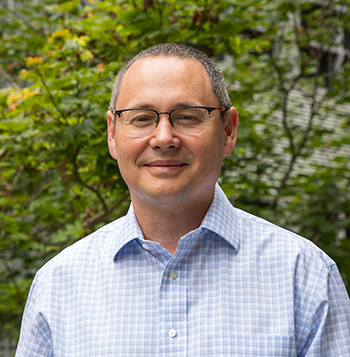For Manel Camps, stepping into the role of Crown College provost wasn’t just a new professional opportunity, it was deeply personal.
“I’ve always been drawn toward pedagogical innovation, in part because education lifted me out of relative poverty” he said. “I wanted to create opportunities for students who, like me, might not come in with a roadmap or the networks that make navigating college easier.”
Camps, who is stepping down after 11 years of leadership at Crown College, brought this perspective to everything he built at Crown. Early in his tenure, he asked himself the question: “What adds value to our students’ education?”
The answer shaped a decade of creative program development. Under his leadership, Crown went from offering just one elective to a robust and growing catalog of interdisciplinary courses—ranging from media production and digital literacy to entrepreneurship and resilience.
“I had no career advising in high school. Someone just handed us a list of possible college degrees,” he said. “It became clear to me that not every degree opens the same doors. And students deserve to know that. I wanted to help students not only understand those paths, but to equip them with skills that might otherwise be out of reach.”
Camps saw the college’s role as complementary to departmental instruction: providing real-world skills and robust transferable skills that help students translate their academic work into meaningful careers. “We focused on two kinds of classes: ones that offer opportunities students wouldn’t otherwise have access to—like community internships or mentorships—and ones that teach transferable skills outside of a student’s major,” he explained.
This approach ultimately led to the launch of the Innovation & Entrepreneurship Certificate in 2025. This Academic Senate-approved certificate, whose development was led by an exceptional lecturer and entrepreneur, Nada Miljkovic, builds on student creativity, community partnerships, and project-based learning. “It didn’t come from a grand plan,” Camps said. “It came from spotting talent, finding opportunities, and doing what was possible with the resources we had.”
Camps also emphasized the importance of creating spaces for student creativity. “Majors are often focused on content. The colleges can be where students explore imagination and expression,” he said. “I’m especially proud of Crown’s sci-fi writing contest, our poetry club, the student theater and podcasting classes and of the training that we provide in video storytelling. These programs give students a way to discover who they are.”
Many of these initiatives were made possible by a major alumni-led fundraising effort turbocharged by a 2022 reunion for Crown’s pioneer classes. “It was incredibly moving,” Camps said. “To see alumni from the late ’60s and early ’70s return to Crown, still seeing it as their home. It brought everything full circle.”
The event led to the doubling of Crown’s endowment and set the stage for more sustained program growth. But even more than resources, Camps said, it showed the lasting impact of having the support of a strong alumni community. “Alumni engagement is a continuum. Some give, some mentor, and some go all the way to taking ownership of projects. This continuum is what we saw at Crown and the formation of a Crown Provost Advising Committee was instrumental in promoting effective alumni engagement.”
Looking ahead, Camps hopes Crown continues to build those bridges—between students and the job market, between campus and community, and between current students and the generations of alumni who came before them. “Our lecturers bring local connections. Our programs open doors. That’s where the college can make a difference.”
As for his own path, Camps said the vision he brought to Crown wasn’t fixed. It was something that evolved as the work unfolded. “It’s like writing an essay,” he said. “You don’t always know what it’s about until you start. But by the end, you understand what you’ve built.”
“The Crown Community has always been unique, bringing together students from science and engineering and from all other fields and disciplines, through speculative fiction, radio and media, and through strong partnership with residential life. Manel brought heart, creativity, and a deep commitment to access and opportunity to Crown College. Through the programs he helped build and the students whose lives they’ve changed, Manel’s impact will be felt for years to come,” said Richard Hughey, Vice Provost and Dean of Undergraduate Education and Global Engagement.
Camps will be succeeded by Professor Katia Obraczka, a computer science faculty member and CITRIS Campus Director. As interim provost, she brings deep research experience and a commitment to expanding Crown’s connections to innovation and interdisciplinary learning.

